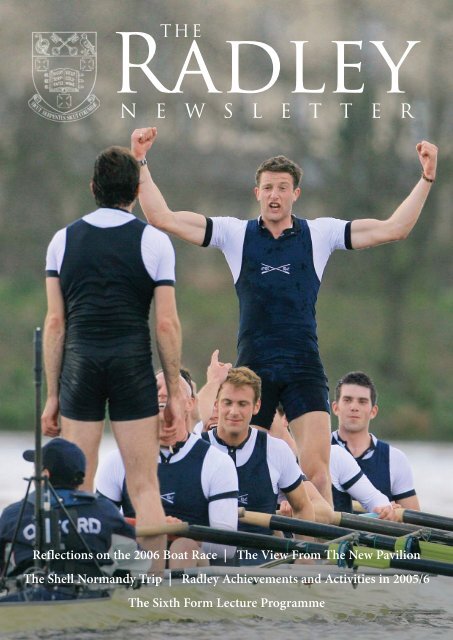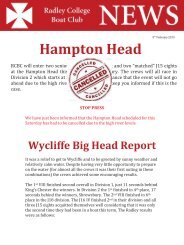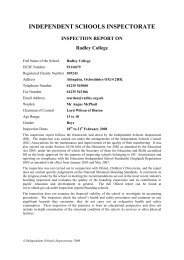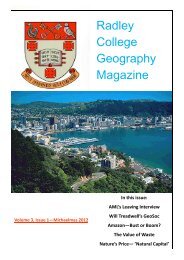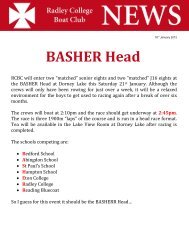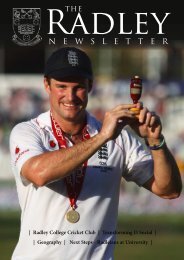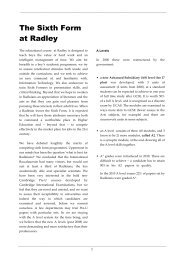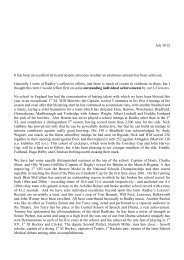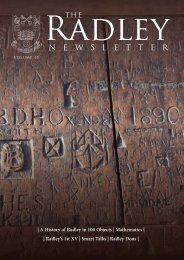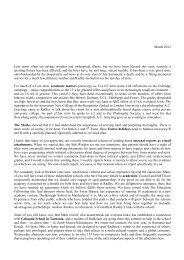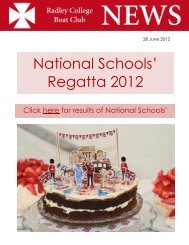Radley Newsletter_No.2 AW.indd - Radley College
Radley Newsletter_No.2 AW.indd - Radley College
Radley Newsletter_No.2 AW.indd - Radley College
Create successful ePaper yourself
Turn your PDF publications into a flip-book with our unique Google optimized e-Paper software.
<strong>Radley</strong><br />
THE<br />
N E W S L E T T E R<br />
Reflections on the 2006 Boat Race | The View From The New Pavilion<br />
The Shell Normandy Trip | <strong>Radley</strong> Achievements and Activities in 2005/6<br />
The Sixth Form Lecture Programme
By Tom Parker OR (Pilgrims’ and H Social)<br />
Tom Parker rowed in an exceptional<br />
<strong>Radley</strong> 1st VIII in 2001, when the<br />
crew reached the final of the Princess<br />
Elizabeth Cup for School VIIIs at Henley.<br />
He went on to row for Oxford Brookes and<br />
for Great Britain, winning a bronze medal<br />
at the World Championships in the VIII.<br />
The Boat Race in 2006 which he describes<br />
here was a titanic struggle in rough<br />
conditions; the strength and will-power<br />
of the Oxford crew in the end broke the<br />
resistance of the favoured Cambridge crew.<br />
The only glamour or delight that is<br />
derived from the Boat Race experience is<br />
in abundance for those few hours between<br />
winning and waking up the following<br />
morning with a sore head; the rest of it is<br />
relentless training around the ruthless<br />
demands for essays from tutors. We<br />
trained very hard and there were times<br />
when I went through days driven only by<br />
the desire to win when the body and mind<br />
was under stress the like of which I had<br />
never experienced. The work is a constant<br />
niggle for the Boat Race athlete, it is everpresent<br />
and, more often than not, one is<br />
invariably behind! In previous years I have<br />
always taken this with a pinch of salt.<br />
Knowing how hard the Blues train I had<br />
presumed that the work must be kept on<br />
the back burner. I had images of the odd<br />
sympathetic nod from an interested tutor if<br />
you were to wearily shake your head amid<br />
murmurings of unhelpful tide tables or<br />
long morning ergo sessions. This, however,<br />
is far from the case. You will be met with<br />
little sympathy if you come up with<br />
excuses for the tardy essay.<br />
April the 2nd this year made it clear<br />
why we had trained so hard; the unique<br />
feeling of the last couple of hundred<br />
metres in very heavy conditions and with<br />
Cambridge 6 lengths adrift, knowing that<br />
you are about to be victorious, makes it all<br />
worth while over and over again. So what<br />
are the emotions that pulsate through your<br />
body when you cross the line victorious in<br />
the Boat Race? The answers I have given<br />
have echoed the stereotype that is<br />
associated with this fairly unique position.<br />
I usually utter phrases such as ‘amazing’,<br />
‘incredible’, ‘something I will never forget’,<br />
which are of course true, but what about<br />
the initial emotion, the very first thing I<br />
thought about. Now that I sit and write<br />
about it for the first time it is clear what I<br />
was thinking; it was disbelief, that we had<br />
actually done what I had been dreaming<br />
about for the last six months. I suppose<br />
the feeling of disbelief came from how<br />
comprehensively we had beaten<br />
Cambridge; how an elite crew had fallen<br />
so hard due to the pressure we put on<br />
them right from the start. As a Blue Boat<br />
athlete you cannot spend any time on<br />
what it is you should feel or do if you<br />
cross the line first; all focus is put into<br />
what you have to do before that time to<br />
give yourself the best possible chance of<br />
2 THE RADLEY NEWSLETTER
eing in that position. But having won so<br />
emphatically against the favourites in one<br />
of the most recognised sporting events in<br />
the British calendar might permit one a<br />
small trace of disbelief.<br />
From a personal point of view I can<br />
base this feeling on the fact that despite<br />
rowing for Britain in the World<br />
Championships, this race was the first<br />
event I have won which contains athletes<br />
of a world class standard. My confidence<br />
in my abilities was by no means backed<br />
up with the plethora of victories that has<br />
dominated the big names in rowing<br />
throughout the Pinsent-Redgrave era.<br />
That night at the Boat Race Ball feelings<br />
of disbelief started to sift away, numerous<br />
congratulations coupled with riotous<br />
celebrations clarified what it was that<br />
the nine of us had achieved that day<br />
and from then on it has been ‘amazing,<br />
incredible and something I will never<br />
forget’.<br />
Front Cover: Tom Parker celebrates Oxford’s victory in the 2006 Boat Race (Getty Images)<br />
Insert: The 2001 1st VIII with Tom rowing at number 5<br />
THE RADLEY NEWSLETTER 3
It is rather extraordinary that for a<br />
school which takes its sport so seriously<br />
there had never been proper changing<br />
facilities for our opposition teams –<br />
until last year, that is. And in responding to a<br />
pressing need the architects managed to create<br />
a spectacular bonus, a low, round building by<br />
the Silk Hall with a circular viewing gallery,<br />
on top of the 8 changing rooms, where tea<br />
is served to parents and visitors on match<br />
days. The view is panoramic, and the focus<br />
shifts with the seasons. So bitter and wet was<br />
it for the last few rugby Bigside matches of<br />
the 2005 season that the less hardy watched<br />
the 1st XV defeat Marlborough and Bedford<br />
from comfortable warmth above the deadthe<br />
view from<br />
New Pav<br />
ball line, cup of tea in hand. Long suffering<br />
Hockey supporters were sometimes driven<br />
indoors whilst the 1st and 2nd XIs compiled<br />
impressive seasons on the new Astroturf.<br />
But the facility’s real versatility is seen in<br />
the summer term: cricketing visitors can<br />
escape chill May winds and watch the 1st XI<br />
on Bigside and the 2nd XI on Secondside<br />
while tennis supporters on the other side<br />
of the gallery watch the school tennis VIs<br />
attempt to match the recent feats of Alex<br />
Hackett (Downsend, H Social) and Tom<br />
Dance (Dragon, H Social), last summer’s<br />
unbeaten 1st pair. Through the trees beyond<br />
the tennis courts is the Radford track;<br />
the start of the 100 metres is crystal clear<br />
below the spectators but a line of plane trees<br />
inconveniently obscures the finish line. No<br />
doubt there will be a long debate between<br />
conservationists and Athletics enthusiasts<br />
about their future….<br />
Not every year does <strong>Radley</strong> produce an<br />
Andrew Strauss OR (Caldicott, B Social),<br />
Jamie Dalrymple OR (Ashfold, H Social), Ben<br />
Hutton OR (Holmewood House, B Social)<br />
or Robin Martin-Jenkins OR (Cranleigh<br />
Prep, B Social) on the cricket field, a Richard<br />
MacDowel (Bilton Grange, G Social) at Hockey<br />
or Chris Sheasby (Caldicott, F Social) at Rugby<br />
– but the hope is to provide future spectators<br />
with an agreeable environment the better to<br />
enjoy competitive games the year round.<br />
4 THE RADLEY NEWSLETTER
the<br />
ilion<br />
THE RADLEY NEWSLETTER 5
the shell<br />
Normandy<br />
trip<br />
by<br />
Dr Jim Summerly, History Don<br />
6 THE RADLEIAN NEWSLETTER
The bus travelled slower and slower.<br />
We were now at walking pace on the<br />
Cherbourg ring road. The hydraulic fluid<br />
was leaking out of the gear box and the driver<br />
found the range of gears he could engage was<br />
disappearing. The video played on. Finally the<br />
driver turned to me and said, ‘that’s it.’ I got out<br />
of the bus and flagged down the first car I saw<br />
with a British number plate. They took me down<br />
to the ferry terminal where the other bus was<br />
waiting, oblivious to our problem (those long<br />
gone days before mobile phones.). The coach<br />
at the terminal put its boys aboard the ship as<br />
foot passengers and went back for my coach’s<br />
passengers who had unloaded and were waiting<br />
by the side of the road. Thirty minutes later we<br />
were all aboard the ship. That was Normandy III<br />
– quite a long time ago and probably the largest<br />
single problem we have ever had. This year was<br />
Normandy XV – one of the quiet ones.<br />
The Normandy trip was conceived back in<br />
1988 as a means of showing Shell boys something<br />
of the realities of warfare during World War<br />
II. It would give a focus to the departmental<br />
teaching on World War II and it would give the<br />
boys the experience of travelling in France. The<br />
idea was that evocative sites such as the Pointe<br />
du Hoc, where the Texas Rangers scaled a cliff<br />
to secure the sites of naval guns that overlooked<br />
Utah and Omaha beaches, would be interspersed<br />
with cemeteries, museums and the beaches<br />
themselves. The reconnaissance trips were done<br />
in 1989 and looking back at the photographs it<br />
is clear the whole area has been transformed for<br />
tourism during the last eighteen years. Videos<br />
on the coaches would provide the images of<br />
1944 and impose them on the imaginations of<br />
the Shells and the whole trip would be given a<br />
commentary and a context by the teaching dons.<br />
Apart from two years when we visited the<br />
World War I battlefields, there has been a<br />
Shell trip to Normandy every year since 1990.<br />
If there is a lull in cocoa back in the Socials any<br />
History don knows the space can be filled with<br />
a Normandy anecdote. If the boys’ memory<br />
of Shell History becomes indistinct in time<br />
they almost always recall quite a lot about the<br />
Normandy landings and some have revisited<br />
the sites with their parents. The Bayeux tapestry<br />
has always been visited and though some of the<br />
early trips probably established record times for<br />
viewing the embroidery I learned to put myself<br />
at the front and defy any boy to go around more<br />
quickly than me.<br />
We must have taken about 1800 Radleians to<br />
Normandy over the years. And we have brought<br />
almost all of them back – though in 1997 one boy<br />
had his appendix removed.<br />
What can you do with 125 Shells in Caen<br />
on a Saturday night? About 60% of Normandys<br />
have included a trip to the Fair where dodgem<br />
cars, go karts and endless varieties of spinning<br />
rides combined with burgers and candy floss<br />
have produced a fair amount of vomit over<br />
the years, and revealed quite surprising skills<br />
amongst my colleagues.<br />
Inevitably, perhaps, it is the stories of<br />
problems and semi-disasters that come to mind<br />
when recalling the Normandy Trip. The boys<br />
probably tell rather different stories but what<br />
they do not usually talk about is the feeling<br />
they get from their presence on the coast of<br />
memories. I can remember minutes of silence<br />
at the Hermanville Cemetery or at Omaha but<br />
the boys will have their own minutes of peace<br />
contemplating war. Omaha and Utah beaches<br />
were often for us the scenes of huge football<br />
matches but just as often boys would turn<br />
their eyes to the sea and wonder. Perhaps they<br />
wondered later when they saw the extraordinary<br />
first twenty minutes of ‘Saving Private Ryan’.<br />
They must have wondered when they saw the<br />
gravestones with the Kipling epitaph, “A Soldier,<br />
Known unto God.”<br />
THE RADLEIAN NEWSLETTER 7
<strong>Radley</strong> Achievemen<br />
ACADEMIC<br />
4The summer 2006 A level results were<br />
good; 84% of grades were at either A or B,<br />
slightly down on the previous year’s 87%<br />
record but very satisfactory nonetheless.<br />
In Latin, Greek, German, Spanish, Music,<br />
Design Technology and Theatre Studies<br />
all candidates achieved either an A or a B.<br />
Hamish Anderson (Cothill, B) and Matt<br />
Atkins (Rokeby School, F) were placed in<br />
Edexcel Product Design’s top 10 (out of<br />
3024) candidates.<br />
4The GCSE results were by some margin<br />
the best ever with an extraordinary 88% of<br />
grades achieved being at either A* or A. All<br />
1224 papers were passed; indeed only 26<br />
papers were C grade. In a host of impressive<br />
performances perhaps English Language<br />
with 115 out of 125 candidates achieving A* or<br />
A deserves special mention. Alexander Rose<br />
(Thomas’s, C) and Theodore Withworth<br />
(Aldro, C) were placed in AQA Spanish’s top<br />
5 candidates (out of 35112 candidates) and<br />
Rory Stallibrass (Milbourne Lodge, C) was in<br />
the top 10 (out of 23164) for Edexcel English.<br />
4Perhaps <strong>Radley</strong>’s proudest academic<br />
performance of the summer was from an<br />
old boy, David Lloyd (Bramcote, A), who<br />
gained the top First in Natural Sciences<br />
at Cambridge, in itself the top and most<br />
competitive Science course in British<br />
universities.<br />
4<strong>Radley</strong>’s Geography Department ran the<br />
web-based Metlink International Weather<br />
project for over 400 schools world wide to<br />
exchange weather data. We also helped to<br />
host the U.K. Raincatch 2005 project.<br />
4The Economics Department entered a<br />
team for the National Interest Rate Challenge<br />
and came 2nd in the southern area.<br />
4Asa Bennett (Dragon, C) was placed 3rd<br />
in the Oxford Area Classical Association<br />
Reading Competition.<br />
4Ed Martineau (Dragon, H) and Tom<br />
McPhail (Dragon, H) won through to the<br />
finals of the National Debating Competition.<br />
4Matt Atkins (Rokeby, F) and Tobin Chew<br />
(Moulsford, D) are both Arkwright<br />
Scholars in Design Technology.<br />
4The <strong>Radley</strong> <strong>College</strong> Chronicle, the new<br />
school newspaper, is written and edited<br />
largely by the boys and has continued to<br />
flourish in its second year with a mix of<br />
reviews, opinion pieces and gentle satire.<br />
14 issues have been published thus far.<br />
4Declamations – judged by Andrew<br />
Trotman, former <strong>Radley</strong> don, now Warden<br />
of St Edward’s Oxford – was of a very high<br />
standard. The competition winners were:<br />
Frederick Moynan (6.2, Belhaven Hill, B);<br />
Jake Cheetham (6.1, Summer Fields, A);<br />
George Leeming (5, Summer Fields, A);<br />
Freddie Tapner (R, Ludgrove, F);<br />
Benjamin Hatt (S, Lockers Park, H).<br />
4Many visiting speakers have come to <strong>Radley</strong><br />
this year, for example: David Cameron<br />
(Leader of the Opposition); Evan Harris<br />
MP; Peter Riddell; Andrew Gordon;<br />
Professor Jim Norton; Tom Shakespeare OR;<br />
Professor Gary Sheffield; Professor Jeremy<br />
Black; Anthony Worrall-Thompson; Clive<br />
Stafford-Smith OR. The biologists welcomed<br />
Professor Nick Rawlins, Dr Martin Speight<br />
and Professor Sir Richard Gardner.<br />
4Rob King, Head of Chemistry, has<br />
written the Chemistry sections of<br />
the AQA and Edexcel new GCSE<br />
Science courses for Harper<br />
Collins. Nick Weaver, Head<br />
of Physics, was runner-up in<br />
the Salters Horner A level<br />
Physics Teacher of the Year.<br />
Iain Campbell has been<br />
commissioned to write<br />
on ‘The Classical World<br />
and Heavy Metal’ in a<br />
German Study of British<br />
Heavy Metal.<br />
4Alex Chadwick<br />
(Cothill, H), Seb Lomas<br />
(Crosfields, H), Jamie<br />
Bromfield (Cothill, A) and<br />
Tobin Chew (Moulsford,<br />
D) have worked with the<br />
RAF to design a system to<br />
test the laden flying capacity<br />
of the Puma helicopter.<br />
4The 6.2 Conference with St<br />
Helen’s in November was one of<br />
the best: controversial, engaging<br />
and with a high standard of debate,<br />
‘Changing the World, Making a<br />
Difference’ had two outstanding talks,<br />
Julian Filochowski on Third World Poverty<br />
and James Mawdesley on North Korea.<br />
4Adrian Pascu (Wirral Grammar, B) was highly<br />
commended in both The Times Stephen Spender<br />
prize for poetry and translation, and Foyle’s Young<br />
Poet of the Year.<br />
200<br />
8 THE RADLEIAN NEWSLETTER
ts and Activities in<br />
5/6<br />
ACTIVITIES<br />
4<strong>Radley</strong>’s revamped Wednesday Afternoon<br />
Activity Programme continues to broaden<br />
boys’ horizons, be it to introduce new skills,<br />
awaken new enthusiasms, or cultivate an<br />
awareness of the importance of helping others.<br />
The 5th Form has been helping patients at the<br />
Nuffield Hospital, organising weekly concert<br />
parties for the elderly and infirm, and teaching<br />
and helping in primary schools.<br />
4Boys have also run, climbed, cycled, swum for<br />
Charities. A total of over £60,000 has been<br />
raised. Patrick Chambers (Cothill, B) raised<br />
over £2500 for Marie Curie Cancer Care.<br />
4229 Blood donations were given by boys<br />
and <strong>Radley</strong> adults this year.<br />
4There has been a wide range of<br />
expeditions and visits: Art Historians<br />
went to China, 6.1 boys to Romania<br />
to run an orphanage holiday<br />
club, Hispanists to Cuba, Paris<br />
exchange with Lycée St.<br />
Geneviève, 40 musicians<br />
performed in Venice in<br />
February, the Bigside<br />
squad worked hard<br />
near Verona, the Shells<br />
invaded Normandy. Most<br />
satisfying have been<br />
frequent favourable<br />
comments from total<br />
strangers on the manners<br />
and behaviour of the<br />
boys.<br />
4A number of boys<br />
achieved Gold Duke of<br />
Edinburgh Awards in<br />
2005/6: Michael Richards<br />
(St. Ronan’s, H), Hugo<br />
Codrington (Elstree, E),<br />
Henry Thompson-Ashby<br />
(Twyford, A), James Brown<br />
(Elstree, A), Charles Twallin<br />
(Cheam, A), Charles Quigley<br />
(Elstree, A), Fred Macnamara<br />
(Summer Fields, E), Tom Cabot<br />
(Sunningdale, E), Ali Holmes<br />
(Caldicott, G), Harry Nicholls (Cothill,<br />
A) and Oliver Hunter (Farleigh, C). Freddie<br />
Bolton (Summer Fields, G) and George Pitcher<br />
(Cothill, B) won the Young Citizen’s Award,<br />
and Hugh Taylor (Cothill, H), Freddie Ackrill<br />
(Bilton Grange, B) and Toby Burgess (Elstree,<br />
D) were awarded the ‘Millennium Volunteer<br />
Award’ for service to the Community.<br />
4David Pumphrey (Northcote Lodge, B)<br />
and Jamie Bromfield (Cothill, A) won<br />
Army Scholarships.<br />
ARTS<br />
4This year has seen the inauguration of the New<br />
Theatre. The Haddon Cup was held in the Old<br />
Gym in October. Late November saw a fitting<br />
opening of the New Theatre with ‘School for<br />
Scandal’, a tour de force, directed by David<br />
Edwards. The theatre has subsequently been well<br />
used for Social plays and culture evenings; last<br />
term Ed. Chalk (Cothill, C) wrote and directed<br />
‘Charlie and the Chocolate Factory’, a colourful<br />
and professional production. Rupert Lazarus<br />
(Moulsford, B) and Rory Stallibrass (Milbourne<br />
Lodge, C) have won places with the National<br />
Youth Theatre.<br />
4It has been a busy year for Music. Trafalgar’s<br />
200th Anniversary was marked by a spectacular<br />
performance of the Choral Society’s Nelson<br />
Mass in Chapel; the Gloria was sung by the<br />
whole school, which lifted the roof. Senior boys<br />
celebrated later with a Nelsonic feast of heroic<br />
proportions. The Scholars’ Concert, Wharton<br />
Piano Prize, Ferguson Singing Prize and Hudson<br />
String Prize were all of a high standard, and<br />
this term’s Warden’s Music in the Theatre was<br />
a great success. So too was the Venice trip<br />
with 40 musicians, performing in – amongst<br />
other venues – St Mark’s. We have a rich vein<br />
of pianists at present: at the Oxford Music<br />
Festival Jonny Williams (Westbourne House, H),<br />
Jamie Brown (Caldicott, D) and Greg Williams<br />
(Norman Court, C) took 1st, 2nd and 3rd in the<br />
U18 Piano Recital class, and Jonny and Greg also<br />
won the Abingdon Concerto Competition. The<br />
Chapel Choir has had a good year; the 16 or so<br />
choristers from local primary schools are a real<br />
addition to its sound. Many of them sang the<br />
May Morning Madrigals from Mansion Roof,<br />
directed by Luke Bartlett. In the Associated<br />
Board exams, George Nye (Dragon, E) achieved<br />
a Grade 8 Distinction in Singing, Jonny Williams<br />
(Westbourne House, H) Grade 8 Distinction<br />
on Piano, Greg Williams (Norman Court, C)<br />
and Arthur Sawbridge (Hall Grove, E) Grade<br />
8 Distinction for Violin. The Ferguson Singing<br />
Competition was won by Robert Crabtree<br />
(Christ Church Cathedral School, E); the Hudson<br />
String Prize by Arthur Sawbridge (Hall Grove,<br />
E) and Myles Watkiss (KCS Wimbledon, H);<br />
the Gunn Cup (Woodwind) by Francis Forbes-<br />
Edwards (St. Piran’s, C); the Gunn Cup (Brass)<br />
by Jamie Hepburn (Sandroyd, D); the Wharton<br />
Piano by Greg Williams (Norman Court, C); the<br />
Guitar Prizes went to Michael Little (Dragon, A)<br />
(Acoustic/Classical); Pelham Groom (Summer<br />
Fields, E) (Electric) and Tom Dance (Dragon,<br />
H) and Nick Holland (Moulsford, B) (Original<br />
Composition). Jonny Williams (Westbourne<br />
House, H) won the Organ Prize.<br />
THE RADLEIAN NEWSLETTER 9
<strong>Radley</strong> Achievements and Activities in 2005/6<br />
SPORT<br />
4The most impressive fact about <strong>Radley</strong><br />
sport is its depth: 21 XVs regularly play<br />
rugby matches in the Michaelmas term,<br />
24 XIs of Hockey and Soccer on a Lent<br />
Term Saturday, whilst at the same time<br />
rowing VIIIs prepare for Spring Heads<br />
of the River and Rackets, Cross Country,<br />
Squash and Golf teams perform on minor<br />
games days. With a roll of 630 boys the<br />
majority represent the school; and unlike a<br />
number of other larger schools, all fixtures<br />
were fulfilled during the World Cup....<br />
4The 1st XV had a good season, and the 42-15<br />
victory over Marlborough, and the 20-12<br />
win at Wellington were highlights. The<br />
Captain, Charlie Oakes (Brambletye, G),<br />
played for the Southern Schools XV. All the<br />
senior XVs were strong (4th XV notably<br />
so) and the Colts 1st XV developed into an<br />
excellent unit. Once again Hockey at <strong>Radley</strong><br />
had a really good year; the 1st XI won or<br />
drew all but 2 games, the 2nd XI lost just<br />
once, other senior sides were strong, and<br />
Midgets 1st and 5th XI, Colts 2nd and 3rd<br />
XIs were unbeaten.<br />
4Whilst Andrew Strauss OR (Caldicott, B)<br />
captained England and Jamie Dalrymple<br />
OR (Ashfold, H) joined him in the one day<br />
squad (a rare moment indeed for 2 players<br />
from the same school to be in the same<br />
England team), a young 1st XI cricket had its<br />
moments this summer with good wins over<br />
Winchester and St Edward’s. Two Radleians,<br />
Thaddeus Cooper (Summer Fields, D) and<br />
Jack Tyrwhitt-Drake (Highfield, E), scored<br />
100’s for the 2nd XI. The Colts XI under The<br />
tutelage of Simon Dalrymple OR (Ashfold,<br />
H) has been successful, and the Midgets year<br />
group as a whole has been strong, Midgets<br />
1st XI beating both Eton and Harrow. It is not<br />
often that a Midget cricketer scores back to<br />
back centuries, as Henry Verrill (Moulsford,<br />
G) did.<br />
4It was not a notably strong 1st VIII this year,<br />
but J16 VIII won the Reading and Wycliffe<br />
Heads and the Reading Amateur title, and<br />
J15.1 VIII gained silver and J15.2 VIII gold<br />
at the National Schools regatta. J15.1 won<br />
at Reading Town Regatta. Tom Parker OR<br />
(Pilgrims’ and H Social) won bronze with<br />
the G.B. heavyweight VIII at the World<br />
Championships and was part of the Oxford<br />
VIII which won the Boat Race in March.<br />
4The Steeplechase winners were Jamie<br />
Bromfield (Cothill, A) (Senior); Archie Vey<br />
(Farleigh, B) (Inter); Xan Wood (Dragon,<br />
E) (Junior), with A Social winning the<br />
overall title.<br />
4In Sailing Sam Petty (Dragon, D) won the<br />
Laser fleet race in the National Schools<br />
Sailing Association Championship at<br />
Farmoor, and the Prism Trophy in the<br />
BSDRA Midlands Fleet Championship.<br />
4The Golf team had a good year with the<br />
side winning 8, losing 4 and drawing 2<br />
school matches. In the West Sussex Trophy<br />
the team (Callum MacQueen (Westbourne<br />
House, A), Tom McPhail (Dragon, H), Tom<br />
Atkinson (Elstree, G) and Harry Nicholls<br />
(Cothill, A)) played very well to come 2nd<br />
out of 22 schools. Tom McPhail retained the<br />
Torrance Trophy at Royal St George’s this<br />
summer.<br />
4The Fencing team, Duncan Browne<br />
(Sussex House, F), Philip Råge (Sussex<br />
House, C) and Fred Ahern (Sussex House,<br />
F) won the Southern Region under 18 Team<br />
Foil Championship.<br />
4In Athletics William Stinton (Sandroyd,<br />
B) (U17 Javelin and Shot), Ollie Hunter<br />
(Farleigh, C) (U20 Hurdles) and Ed Barton-<br />
White (Oratory Prep, D) (U20 Triple Jump)<br />
were County Champions.<br />
4Henry Arundel (Ludgrove, F) has raced<br />
for the Fortec Racing Team in the British<br />
Formula BMW Championship.<br />
10 THE RADLEIAN NEWSLETTER
the<br />
Sixth Form<br />
Lecture Programme<br />
For the past dozen years <strong>Radley</strong>’s 6.2 has attended successive<br />
series of weekly lectures in the Michaelmas and Lent Terms given<br />
by distinguished visiting speakers. They have been an important<br />
element in Radleians’ education, designed to inform, stimulate and<br />
provoke. Across the years it seems that they have succeeded in their<br />
aim; many speakers have commented on the quality, directness and<br />
perception of the questions, and many Radleians have, in their<br />
turn, affirmed that the lectures have left a real mark on<br />
them. For example, Gena Turgel came ten years ago,<br />
a concentration camp survivor from Auschwitz and<br />
Belsen, and her testimony had a profound effect on all<br />
who heard her; Clive Stafford-Smith OR, death-row<br />
lawyer, only this year overturned many comfortable<br />
assumptions when he challenged boys to engage with<br />
the treatment of prisoners in Guantanamo Bay, in<br />
an impassioned lecture; and Colonel Mark Cook so<br />
moved his audience about the conditions in post-war<br />
Bosnia that it raised £38,000 for his charity Hope and<br />
Homes for Children.<br />
We have entertained enough front-line politicians<br />
to people a whole government: a Prime Minister,<br />
John Major, who was as engaging and enthusiastic<br />
on cricket as he was on the condition of politics post-<br />
1997; two foreign secretaries, Lords Howe and Hurd, a<br />
Lord Chancellor (Lord Falconer), two Tory leaders in<br />
the Lords (Viscount Cranborne and Lord Strathclyde)<br />
and a Labour leader (Lord Richard); a Speaker of<br />
the House of Commons, Lord Weatherill (a truly<br />
delightful, witty raconteur, and a real favourite with<br />
his audience); a Conservative Party Leader, rehearsing<br />
for us six days before he launched his now famous<br />
Party Conference bid for the top – David Cameron;<br />
a Chief Secretary to the Treasury, Rt. Hon. Andrew<br />
Smith MP; and a maverick entertainer with a razorsharp<br />
mind, Boris Johnson MP. Alternative political<br />
messages were articulated particularly brilliantly<br />
by Jonathan Porritt (Friends of the Earth) and Sir<br />
Crispin Tickell, again on the importance of the<br />
environment.<br />
Quite as informative, often quite as articulate<br />
as the statesmen have been the political journalists<br />
we’ve hosted: Melanie Phillips was impassioned in her<br />
attack on ‘All Must Have Prizes’, a prevailing ethic of<br />
rewarding mediocrity; Peter Hitchens was terrifying<br />
in his vision of creeping statism; Yasmin Alibhai-<br />
Brown icily angry over Iraq; Andrew Marr, David<br />
Aaronovitch and Fergal Keane all cerebral and witty on aspects<br />
of Britishness and Identity; and Libby Purves and Peter Riddell<br />
(a regular) have brought us the incisiveness of their Times columns.<br />
For an overview which seeks to make sense for the boys of what<br />
has happened in the past we’ve had some notable historians: Viscount<br />
Norwich on the importance of saving Venice, Andrew Roberts on<br />
counter-factual history, Niall Ferguson whose ‘Pity of War’ revised<br />
some common misconceptions of World War One, Field Marshal Lord<br />
Bramall on being a young officer in Normandy, June 6th 1944, and<br />
General Sir Mike Jackson on a more recent war in Kosovo. And to make<br />
boys think about morality and ethics we have had Peter Garratt from<br />
LIFE on abortion, Tom Shakespeare OR on genetic manipulation and<br />
selection, and Marianne Talbot on moral relativism.<br />
Equally important has been the aim to give boys an<br />
understanding of business and the economy. Since 1994<br />
they have heard from Mervyn King, Governor of<br />
the Bank of England; Professor John Quelch of the<br />
Harvard Business School; Bridget Rosewall (one of<br />
the government’s economic advisers); Professor Jim<br />
Norton on technological advancement; Johnnie<br />
Boden on founding a mail-order business; Eric Nicoli<br />
on adapting EMI to radical shifts in music technology;<br />
Rupert Lowe OR on running a football club<br />
(Southampton); and Peter Bazalgette on reality TV.<br />
The Lecture cycle has also been a means to<br />
broadening cultural horizons. Sessions on music<br />
have ranged from popular musicals (Sir Tim Rice<br />
on his career), to biographical (Hilary du Pré talking<br />
on her sister Jacqueline) and to lecture recitals (sung<br />
by Ann Murray, parent and opera diva and Andrew<br />
Kennedy, former <strong>Radley</strong> don and recently winner<br />
of the Leider prize at the Cardiff singer of the year<br />
competition). There have been equally memorable<br />
lectures on art and design, from talks by Gavin Stamp,<br />
Sandy Nairne OR and Richard Cork, to more practical<br />
demonstrations of a designer’s oeuvre from Dick<br />
Powell of Seymour Powell. We’ve had writers<br />
(a poetry reading by Old Radleian Poet Laureate<br />
Andrew Motion, and readings from the Amber<br />
Spyglass by Philip Pullman), wine critics (most<br />
notably, Jancis Robinson, conducting a communal<br />
wine taste for 120 boys) and a celebrity cook,<br />
Anthony Worrall-Thompson.<br />
Finally, we recognize how much the boys are<br />
inspired by listening to tales of human endeavour.<br />
We’ve heard from three successful conquerors of<br />
Everest (including the youngest, Bear Grylls, and<br />
the first British woman, Rebecca Stephens); from<br />
successful Olympians, for example Matthew Pinsent;<br />
from sports journalists like Clare Balding and Simon<br />
Hughes, and sports lawyers, the doyen of whom<br />
is Michael Beloff QC, recently retired President of<br />
Trinity, Oxford, who has spoken twice at <strong>Radley</strong>.<br />
We are hugely grateful to all the speakers who sacrifice their time to<br />
come to <strong>Radley</strong>; their efforts have been, and will continue to be, greatly<br />
appreciated, not least because their stories, their message, are not<br />
incorporated in A level syllabuses. And we hope that only a very few<br />
will emulate the nameless politician who rang when barely three miles<br />
from the school to ask ‘what exactly am I speaking on today?’ In the<br />
end the MP for Henley improvised very well in the time available….<br />
Getty Images<br />
THE RADLEIAN NEWSLETTER 11
adleians<br />
Hector Bevan (Shell)<br />
LUDGROVE AND G SOCIAL<br />
After leaving Ludgrove I had huge<br />
expectations for <strong>Radley</strong> and it has lived<br />
up to them. I really enjoy my sport but<br />
I knew that my work would have to come first<br />
and I knew that <strong>Radley</strong> would help me to find<br />
the right balance between the classroom and the<br />
sports field.<br />
The rugby term was great fun despite my<br />
team’s lack of wins (Midgets 2). This did not<br />
stop the team enjoying themselves. We all have<br />
to play rugby, which for me was great. I really<br />
enjoyed it and also having this compulsory<br />
sport means that you have one less decision to<br />
make in your very hectic first couple of weeks<br />
at <strong>Radley</strong>. The Lent term brought on the new<br />
challenge of sculling which I was keen to try, as<br />
hockey and cricket had never been my strong<br />
points. Having sculled as a Wednesday option<br />
in the Michalmas term I saw that it could be<br />
great fun particularly as I have not capsized so<br />
far! The rowing in the Lent term was cold and<br />
I prefered the warm weather and regattas in<br />
the summer.<br />
Having taken a scholarship in March 2005<br />
(JP Couzens Scholar) I did feel a little academic<br />
pressure and after five months without huge<br />
volumes of work I felt ready to go. I was very<br />
happy to find the first couple of weeks a gentle<br />
build-up to what I would find to be a challenging<br />
load but I soon got used to it. The workload at<br />
my prep school was certainly much lower than<br />
what I now know to be the <strong>Radley</strong> norm.<br />
Being a Shell boy at <strong>Radley</strong> is great, and I<br />
think it will get even better in years to come.<br />
There is so much to get used to in your first term<br />
and in the first few weeks you are given a taster<br />
of all the activities in a round robin. This gave a<br />
little taster to a huge array of sports and activities<br />
for people to get involved in. Music lessons are<br />
also fun and I have been very fortunate to have<br />
the same teacher from my prep school teaching<br />
me here. There are a huge variety of instruments<br />
to be played and you will come across people<br />
who play several instruments.<br />
One of the highlights in the first term in<br />
the Shell is the Haddon Cup. Unfortunately the<br />
new Theatre was not open but then we had the<br />
honour of being the last performers in the Old<br />
Gym. It was great fun and although every year<br />
in G had won it in the Shells D Social narrowly<br />
beat us.<br />
Overall life at <strong>Radley</strong> has treated me well<br />
and I am looking forward to my Remove year.<br />
Edward Martineau (Senior Prefect)<br />
DRAGON AND H SOCIAL<br />
Whenever the name <strong>Radley</strong> comes<br />
up in conversation with an adult<br />
I’m meeting for the first time the<br />
question invariably seems to be either ‘do you<br />
row?’ or ‘are you a rugby player?’ Humbly, I am<br />
forced to concede that I have never indulged<br />
in the former, and that my abilities in the latter<br />
would perhaps have been better left untried; a<br />
recent venture onto the pitch for a tame contest<br />
of inter-social rugby resulted in a knee injury<br />
that kept me out for the rest of the season.<br />
Thankfully, however, I have found other<br />
means to occupy my time. Since arriving at<br />
<strong>Radley</strong> acting has been a huge passion of mine,<br />
and I’ve been fortunate enough to have the<br />
opportunity to get involved in three school<br />
productions that I will never forget. The sheer<br />
variety made each special in different ways,<br />
starting with the musical Cabaret in the fifth<br />
form, then moving on to Shakespeare’s A<br />
Midsummer Night’s Dream in the 6.1, and<br />
ending with Sheridan’s Restoration comedy,<br />
School For Scandal.<br />
Cabaret was great fun, incorporating a<br />
group of Downe House students as the Kit<br />
Kat Klub girls which obviously added to the<br />
glamour, as well as having an orchestra onstage<br />
- a sensational feeling as you sung the numbers,<br />
albeit in lycra and fishnets at certain points<br />
(I regret to say that my mother still has photo<br />
evidence). In fact, A Midsummer Night’s Dream<br />
forced me into equally unfortunate attire, being<br />
set in modern day costume; some are made to<br />
be tattooed and topless - not me.<br />
In both Cabaret and A Midsummer Night’s<br />
Dream I was double cast with another boy,<br />
named Lawrence Grant, in the year above.<br />
This was an inevitably double-edged sword.<br />
On the one hand I was glad to have the company,<br />
since both Emcee and Oberon were fairly solitary<br />
roles. On the other hand it was agony having<br />
to watch the other actor playing the role on his<br />
nights. It was made easier, though, by the fact<br />
that we were so dissimilar; he was a thin, blond<br />
would-be rock star; I was a brown haired student<br />
with an affinity for Latin. Despite the underlying<br />
hope that the other would develop a sudden<br />
bout of flu in the final week leading up to the<br />
performance, it was a largely positive, and mainly<br />
productive, experience working together.<br />
I was delighted nevertheless to be single<br />
cast in the final production of School For<br />
Scandal. Indeed, the whole play was particularly<br />
significant to me for a number of reasons; it<br />
was the opening of the new theatre; it was my<br />
final school play; I was getting to act alongside a<br />
number of 6.2 actors who I’d never been in scenes<br />
with before; it was an all boys production rather<br />
than being done with Downe House girls as the<br />
previous two; my character, Sir Joseph Surface,<br />
was a devious, two-faced scoundrel – huge fun to<br />
play; and the director, due to the current head of<br />
drama being on maternity leave, was my housemaster<br />
– a man with a voice so booming that it<br />
would rival Brian Blessed’s. Furthermore, the<br />
new theatre was a fantastic place to act, making<br />
the show feel so much more professional for the<br />
sheer ambience.<br />
I would have to admit that almost all of<br />
my hobbies have really revolved around public<br />
speaking. Debating has also been a source of<br />
pleasure over the past few years, and perhaps the<br />
greatest source of annoyance as well. I don’t feel<br />
that I’m a particularly bad loser in most arenas<br />
but if I lose in a debate a subsequent sulk emerges<br />
that would rival Eeyore at his birthday party.<br />
In the 6.2 I was lucky enough to become<br />
Senior Prefect, a role that, I have to confess,<br />
I very much enjoyed. I no doubt over-indulged<br />
my argumentative side as well as the attempted<br />
gravitas of the chapel readings, but it has been<br />
really interesting trying to mediate between the<br />
boys and dons, which I would see as the main<br />
importance of the job.<br />
When you come close to leaving <strong>Radley</strong><br />
the things you will and won’t miss become<br />
unmistakeably apparent. For the most part I feel<br />
ready to move on to university. However, seeing<br />
the audition sheet go up for next year’s production<br />
of A few good men did spark a tinge of envy. The<br />
new theatre really has opened up the possibilities<br />
for the school drama, and not being a part of that<br />
is perhaps one small source of regret.<br />
I would hate for this article to sound like<br />
some false sycophantic rant about how wonderful<br />
<strong>Radley</strong> is. It’s obviously entirely dependent on each<br />
person. The one common feature I imagine all<br />
of us would identify as having acquired after five<br />
years, however, is the ability not to take ourselves<br />
too seriously. The all boys’ boarding school<br />
experience seems to have been all about realising<br />
the archaisms and eccentricities of the system, and<br />
appreciating them. I would hope that I don’t take<br />
myself too seriously. After the ridiculous costumes<br />
and hairstyles (which I’m frequently reminded of)<br />
it would certainly be hard to.<br />
12 THE RADLEY NEWSLETTER Website: www.radley.org.uk . Admissions enquiries: 01235 543174 . admissions@radley.org.uk


